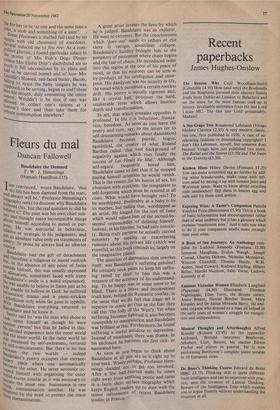Fleurs du mal
Duncan Fallowell
Baudelaire the Damned F. W. J. Hemmings (Harnish Hamilton £15)
Iam convinced,' wrote Baudelaire, 'that inY life has been damned from the start, d b' always seeks will bto dise.' Pcoverrofesswhy Baudelaire
or Hemmings's 1.,
,ei YaPhy.tev
ed this, but the real question is: did he believe it? The poet was his own chief sub- 'p t and thought many incompatible things Pout himself according to mood or pur-
oE. S— He was mercurial in behaviour, relative or strategic in his judgments, and Dput an absolute value only on statements of 2etrY. In prose he always had an ulterior
tive.
a Baudelaire had the gift of detachment but therefore a religious or moral outlook the absence of any point of focus utside himself, this was usually expressed fri, alienation, sometimes laced with irony `4"andelaire's smile is a weird experience). we was unable to believe in Satan just as he as unable to believe in God: he suffered prersecution mania and a panic-stricken rholicism only when far gone in syphilis. with Baudelaire everything returned to andelaire and he knew it. lo Sartre said he 'was the man who chose to anc)I( upon himself as though he were If °tiler person' but that he failed in this. He divided experience into the outer world w11,ncl the inner world. In the outer world he jb Paralysed by self-awareness, tortured , elf-consciousness. But there is no line ictween the two worlds -- indeed ciudelaire's poetry occupies that extraor- h:14rY place where one automatically eil`e(!tries the other. He never seriously oc- %, Died himself with organising the outer except insofar as it was necessary to thistain the inner one. Sustenance is one ob'rig, contamination another. He was fr ore by the need to protect the muse contamination.
A great artist invents the laws by which he is judged. Baudelaire was an explorer. He went to extremes. But the consciousness which 'goes out' needs its tethers or else there is vertigo, sometimes collapse. Baudelaire's lucidity brought him to the periphery of perception where chaos begins and the fear of chaos. He introduced order into this region at the cost of his peace of mind, so that his neuroses can be seen as by-products of his intelligence and enter- prise. His dandyism was his security in life, the vessel which permitted a certain rootless drift. His poetry is equally rigorous and, like a crystal ball, possesses the hard, unalterable form which allows limitless depth and transformation.
In art, that which contains opposites is profound. In life it is indecision, frustra- tion, boredom. As soon as you leave the poetry and turn, say, to the letters (or to self-dramatising remarks about damnation) Baudelaire becomes puerile, bogus, egotistical, the creator of what Roland Barthes called 'that vast background of negativity against which rises finally the success of Les Fleurs du Mai.' Although self-regard frequently bored him, Baudelaire came to feel that if he stopped paying himself attention he would vanish. This is the reason for his horror of sex, his obsession with eroticism: the temptation to self-forgetting which must be resisted at all costs. What would have brought rest? To be worshipped. Preferably as a baby is by its mother, but failing that, worshipped as an artist. He longed for the sort of fame whith would relieve him of the second-by- second responsibility of defining himself. Instead, in his lifetime, he had only notorie- ty. Being truly perverse he actually curried notoriety by seeding or exacerbating rumours about his private life (which was eventful, as this book reminds us, largely on the imaginative plane).
The question of damnation then rewrites itself: was Baudelaire's suffering genuine? He certainly took pains to keep his suffer- ing tuned up since to him this was a measure of the accuracy of his understand- ing. To be happy was in some sense to be blind. There is a brave and inconvenient truth here, behind the Romantic overlay, in the sense that we do feel that tragic art is superior to comic art (but in the East they call this 'the folly of the West'). Yet when suffering becomes habitual it also becomes susceptible to manipulation and Baudelaire was brilliant at this. Furthermore, he found suffering a useful antidote to depression. Instead of numbness, there was drama. In his enclosure he becomes the first sick- or nauseated-hero.
As soon as you begin to think about Baudelaire at all you are in it right up to your neck. Wisely perhaps, Professor Hem- mings decided not to get too involved. After a few half-hearted stabs he steers right away from anything poetic and turns in a fairly short surface biography which keeps English readers up to date with the minor refinements of recent Baudelaire
studies in France.










































 Previous page
Previous page